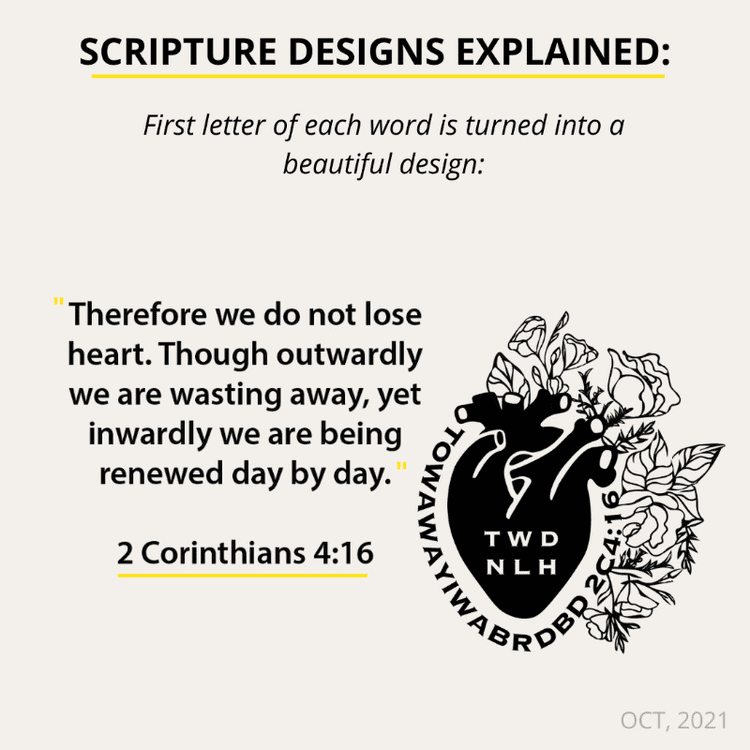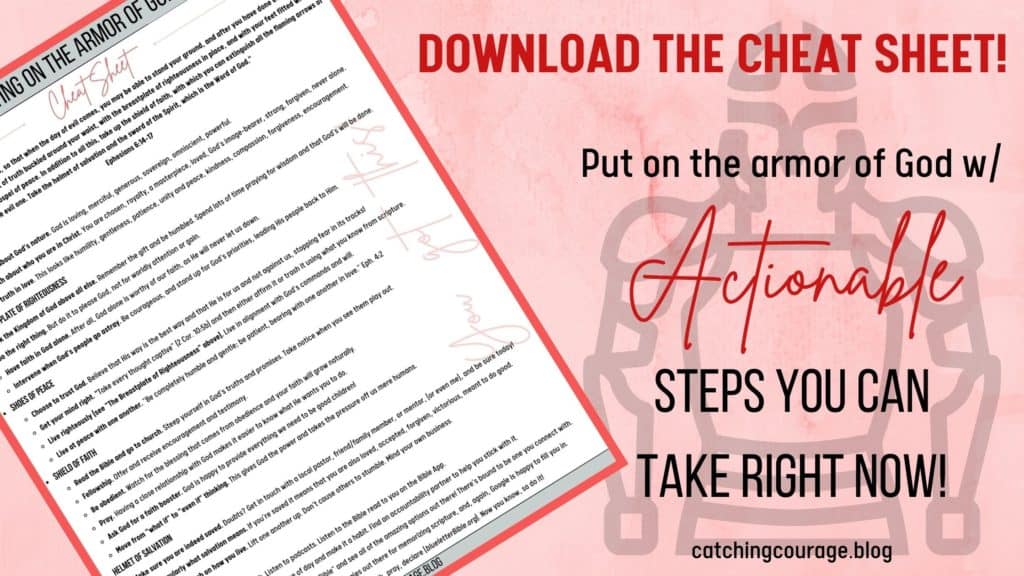Taking Up the Sword of the Spirit
Thanks for coming back to continue our study of the armor of God, in which we give you practical tips on how to use the armor of God every day! In this post, we will be discussing the sword of the spirit, which is the last part of the armor of God. It has been so educational and interesting unpacking this scripture that I’m kinda sad it’s almost over.
If you haven’t already, consider going back and reading at least our introduction to the topic of the armor of God and why we need it. Part 1 covers the belt of truth. And here’s a link to part 2 (the breastplate of righteousness), part 3 (the shoes of peace), and part 4 (the shield of faith). Last but not least, part 5 covers the helmet of salvation. But if you’re ready to learn how to put on the helmet of salvation, then let’s go!
But really quickly, to keep first things first, here’s the piece of scripture we’ve been unpacking:
“Therefore put on the full armor of God, so that when the day of evil comes, you may be able to stand your ground, and after you have done everything, to stand. Stand firm then, with the belt of truth buckled around your waist, with the breastplate of righteousness in place, and with your feet fitted with the readiness that comes from the Gospel of peace. In addition to all this, take up the shield of faith, with which you can extinguish all the flaming arrows of the evil one. Take the helmet of salvation and the sword of the Spirit, which is the Word of God.”
Ephesians 6:14-17
Contents
What is the Sword of the Spirit?
The sword of the spirit is actually the Word of God. I actually looked high and low in the Bible to find where it said this, and, duh, it’s right there in the feature scripture (above). *eye roll* Cottonheadedninnymuggins strikes again. *laughs at self*

Anyway, the cool thing about the sword of the Spirit is that it is proactive, helping you to look forward and identify potential problems before they become problems, while the rest of the armor of God is protective (protecting you when attacks make it all the way to you).
This means that the sword is the most important part of the armor. This is because if you’re using it correctly, the other pieces of the armor are secondary, or there to protect you if you fail to use the sword to its full potential.
Before we dive into how to use the sword of the the Spirit, let’s take a moment to learn more about the Word of God, since it IS the sword of the Spirit.
God’s Word is…
- flawless (2 Sam. 22:31, Psalm 18:30, Prov. 30:5)
- sharper than a 2-edged sword (Heb. 4:12)
- alive and active (Heb. 4:12)
- enduring (Isaiah 40:8, 1 Pet. 1:25
- Jesus (Rev. 19:13)
- not chained (2 Tim. 2:9)
- is at work in you (1 Thess. 2:13)
Ultimately, the Word of God is for bringing us closer to God, making us more like Jesus, and, most importantly for this post, fighting our enemy, Satan.
Satan's attacks will often entail trying to get you to deny, doubt, disobey, or debate God's Word. But when you know God's Word inside and out, you make it very difficult for Him to succeed. Share on XWhat God’s Word isn’t is for fighting people. Too many times, self-righteous Christians use God’s Word, or the sword of the Spirit, to bully other people, sometimes even other Christians. It’s okay to use it for instructing or helping people be more like Jesus [this is called “discipleship,” and all followers of Jesus are called to do this (Matt. 28:19)], but it is never okay to use it to manipulate people or make them feel like they’re somehow less than.
How to Use the Sword of the Spirit
If the sword of the Spirit is the Word of God, it could also be said that the Word of God is a sword. I know, I know – I just rearranged the words; but I think this makes God’s Word feel more like something you could pick up and wield. But how do we do this?
There are 5 ways to make sure you have a strong grasp on the sword of the Spirit, or the word of God, so you can be a doer of the word and not just a hearer of the word.
“But don’t just listen to God’s word. You must do what it says. Otherwise, you are only fooling yourselves.”
James 1:22
- Hearing the Word of God
- Reading the Word of God daily
- Studying the Word of God
- Memorizing the Word of God
- Meditating on the Word of God
Hearing the Word of God
Science has proven that we retain about 5% of what we hear. We are told in the Bible time and time again to listen carefully, by God, by the prophets, by the disciples, and by Jesus.
Have you ever said, “Listen carefully?” Think about those times and what you really meant. When you said, “Listen carefully” to your kids or maybe an employee, what you wanted was for them to not only hear you, but understand you. And to understand you, they had to give you their complete and undivided attention.

That’s what God wants from you, too. He want to know that you’re really listening because you care what He wants to tell you and becuase you want to understand what He’s saying. All you have to do is pray that He would open your ears and mind to hear what He truly wants to tell you when you hear someone teaching about the Bible.
Reading the Word of God
Reading something increases our retention to around 15%. Also worth noting is that reading the Word should be done outside of church. At church, we’re mostly hearing the Word, anyway.
It’s so important to spend time every day in the Word. First thing in the morning is a great time to do this as it fills you up with wisdom and encouragement for the day ahead. But, really, anytime is a good time to be in the Word and fellowship with God. And once you’ve picked your time, let somebody know about your new habit so they can hold you accountable.

Here are some reasons to read the Bible every day:
- To fuel our faith
- To inform our world view
- To direct our activities
- To nurture wisdom
- To reflect on life
- To strengthen our convictions
- To incline our hearts to righteousness
- To meet with God
- We need daily guidance
- It helps us grow in our faith
- It helps us to be a good witness to others
- We can learn something new about God every day
- It convicts us of sin
- It aligns our hearts with God’s heart
from dailyshepursues.com
Something I’ve been doing lately is listening to the Bible app read scripture to me while I read it to myself. Basically, I’m reading the Bible and hearing it all at the same time! My hope is that then I will retain even more than when I just read it. Plus, the narrators read it all dramatic like, which makes it way more entertaining. Hehe.
Studying the Word of God
Not surprisingly, when we study something, we are able to retain more of it – retention goes up to about 35%. That’s why we “study” for tests. Bible studies are a great way to dive deeper into God’s Word (and if you do it with friends you can dip into “way to use the sword of the Spirit #5,” which is “meditating on the Word of God”).
Studying the Bible deepens your understanding of what we may have read or heard. It helps us make connections beween scriptures and find common themes, both of which help us strengthen our grip on the sword, helping us to be more effective doers of the Word. And it can enrich our faith walks by shining a spotlight on the faith and testimonies of the early believers.
There are many ways to study the Word of God. Some methods include:
- The Sword method
- Character study
- The S.O.A.P method
- Scripture journaling
- Topical/thematic study
- Study cross-references
- Word study
- The A.P.P.L.E. method
- Verse mapping

Here are a couple of good resources for learning more about the different ways to study the Bible:
Memorizing the Word of God
Obviously, memorizing the Word of God is the only way to guarantee 100% retention. I’ll admit, I’m lacking in this area, so for my own benefit, and hopefully yours, too, I’m going to spend a little more time on this one.
“I have hidden your word in my heart, that I might not sin against you.”
Psalms 119:11
One of my favorite ways to memorize anything is by using songs or rhythmic chants, but there are a lot of helpful tips and tricks that can be used to help memorize things.
Memorization Strategies to Help You {me} Memorize Scripture
- Fill-in-the-blanks – Write the scripture on a dry erase board. Read through it a few times until you’re comfortable with it. Erase a word. Read it through, filling in the blank with the missing word, of course. Erase another word. Read it again. And repeat until you’ve erased all words and can recall the entire verse.
- First letter – Write the first letter of each word in the scripture you’re committing to memory on a sticky note and hang it somewhere you’ll see it often. Or write them on the back of your hand. Or try these cool tattoos that put the letters into pretty designs. Every time you see the sticky note or tattoo you’ll be reminded to practice, and the first letter of each word will serve as a reminder of the words in case you forget.

- Memory box system – When my daughter tried for (and won) the title of Memory Master with our Classical Conversations homeschool group, this is how we made sure she had committed over 200 pieces of information to memory so she could recall it all in one sitting without help.
How it works is this: procure a notecard box. Separate your box into 5 sections. Section 1 will get reviewed every day. Section 2 will get reviewed 2 or 3 times a week (i.e. every Monday and Wednesday). Section 3 will get reviewed once or twice a week (i.e. every Tuesday). Section 4 will get reviewed every other week (i.e. every other Thursday). And section 5 will get reviewed once a month (i.e. first Friday).
Choose how often and on which days you will review each section and create a card with your personalized instructions. Place this in the front of the box for reference. Write each scripture you want to memorize on its own notecard (put the scripture reference on the front and the scripture itself on the back) and place all the notecards in section 1.
Now your system is set up, and you can start using it! Each day you will review the scriptures in that day’s section. If you are able to recite it without help, you move it to the next secion back (yay)! If you aren’t, you must move it forward a section to be studied more frequently until you have it memorized again.
There’s even an app to make this scripture memorization system digital! - The rubberband bracelet method – remember when you were a kid and you would draw or write on rubberbands while they were stretched out and then unstretch (?) them? You were left with a blob of ink that was pretty much illegible. Well, you can do that with scriptures! Not only does the rubberband around your wrist remind you to practice your scripture, it is also all written out there in case you need to stretch it out for a reminder!

- Song or chant method – Like I said, this one’s my favorite. For some reason I’ve always been good at memorizing songs or rhythmic chants. It doesnt’ seem to matter what I’m memorizing, either; a list, a sentence, or a whole paragraph can be put to music or rhythm and memorized in no time. There are even whole collections of Bible verse songs already written to make this method even easier, like this one by Seeds Family Worship.
“The law of his God is in his heart; his steps do not slip.”
Psalm 37:31
Meditating on the Word of God
Once you’ve done all of the above, you’re ready to start meditating on everything you’ve heard, read, and memorized. What does it mean to mediatate on God’s word?
Merriam-Webster defines “meditate” as “to engage in contemplation or reflection” and “to focus one’s thoughts on : reflect on or ponder over.”
And the Blue Letter Bible gives us some insight into the meaning of the word “meditate,” too. Not only does it give it the meaning “muse,” which is in line with the Merriam-Webster definition, it also assigns the following meanings to it, as found in the Old Testament:
- speak
- imagine
- study
- talk
- pray
- declare

So to meditate on God’s word means not only to think about it, but to talk about it, pray about it, study it, and declare it!
“Study this Book of Instruction continually. Meditate on it day and night so you will be sure to obey everything written in it. Only then will you prosper and succeed in all you do.”
Joshua 1:8
It can be so easy to gloss over things in this day and age. After all, we are bombarded with messages of all kinds from the moment we wake up till the moment we fall asleep. But we don’t actually understand any of the more complex ones, like Scripture, until we stop to consider them and how they apply to us and the world around us.
But let’s not stop there! Let’s talk about what God is saying to us through His Word. Let’s pray for understanding. Let’s declare His word over our lives, our people, and our situations. And let’s imagine what the world would look like if all believers did the same!
According to scripture, we are to “meditate on [God’s Word] day and night.” Let’s all take a hard look at our habits and ask ourselves if we do, indeed, consider, talk about, pray about, and declare the truths of God all day, every day. *cringe* I know I sure don’t. There are always so many people and tasks vying for my attention that it’s easy for something so un-demanding to slip into the background.

If you’re in the same boat, it’s ok! Let’s commit together to spend more time reflecting on God’s Word! Comment below if you’re in! If nothing else, it’ll help me feel more accountable! LOL!
Why Use the Sword of the Spirit?
Scripure gives us many reasons to make sure we have a strong grasp on the sword of the spirit enabling us to use it effectively. There are a couple scattered throughout the post above. Here are a couple more.
“Do not merely listen to the word, and so deceive yourselves. Do what it says. Anyone who listens to the word but does not do what it says is like someone who looks at his face in a mirror and, after looking at himself, goes away and immediately forgets what he looks like. But whoever looks intently into the perfect law that gives freedom, and continues in it—not forgetting what they have heard, but doing it—they will be blessed in what they do.” James 1:22-25
“Blessed is the man who walks not in the counsel of the wicked, nor stands in the way of sinners, nor sits in the seat of scoffers; but his delight is in the law of the Lord, and on his law he meditates day and night. He is like a tree planted by streams of water that yields its fruit in its season, and its leaf does not wither. In all that he does, he prospers.” Psalm 1:3

We are more likely to obey God.
Scripture should dictate all of our actions. If something we want to do isn’t in line with what God wants us to do, we shouldn’t do it. It’s disobedience. Period. And how are we supposed to know what we are to do or not do if we don’t study and meditate on God’s Word? Hm? Hm? I suppose sometimes He just tells us, but we won’t have that kind of relationship with God if we aren’t spending time in His Word, so, there.
It brings blessing, prosperity, and success.
God gave us His Word to give us a leg up in this world. He commanded us to do what He commanded us to do because He loves us and wants us to be successful in all that He has planned for us. Our success = His success. So why wouldn’t He want us to prosper and be blessed?
We will be better equipped to recognize the lies of the enemy.
We can only fight Satan’s lies if we know they are lies. Unfortunately, the lies of the world and Satan are oftentimes louder and more in-your-face than God’s truths. The only way to be able to squash these lies is by knowing the truths that counter them.
It gives us precious insight into the identity and character of God Himself.
If we only focus on bits and pieces, we’re missing the big picture. We need to do our very best to internalize it all. Yes, it might only happen in bits and pieces, but constantly looking for connections between those bits and pieces is key to true understanding.
When we are intimately familiar with God's Word, it is easier to be intimately familiar with God. Share on XSword of the Spirit – Summary
To sum up, effectively using the sword of the Spirit, which is the Word of God, is achieved by hearing the Word, reading the Word daily, studying scripture, memorizing it, and meditating on it.
When we effectively use the sword of the Spirit, we are protected enough that the rest of the armor becomes plan B. Don’t get me wrong, it’s all important. But the sword is at the top of the list. I mean, a soldier wouldn’t go into battle without his sword; that would be foolish, right? Likewise, going into spiritual battle without our swords is just as foolish.
Not only will we be able to defend ourselves, we will prosper and succeed. Our “steps will not slip.” And, perhaps most importantly, we will enter into a more intimate relationship with our Creator, who designed us specifically for relationship with Him.

Putting on the Whole Armor of God – Summary
Instead of adding to this already lengthy post by summing up this whole series, I will simply share with you a Cheat Sheet I created that contains actionable steps you can take today to put on each piece of God’s armor. I pray that it helps take the mystery out of Paul’s words and enables us all to remain standing through all that the enemy of our souls tries to do to us *tear* (yes, I’m crying. I love you all so much and want you to be equipped to be powerful fighters of the faith).
Remember, “we are not fighting not against flesh and blood, but against evil rulers and authorities of the unseen world, against mighty powers in this dark world, and against evil spirits in the heavenly places” (Ephesians 6:12). Sounds a little scary, I know! But, luckily, God has given us all we need to be victorious! Download the free cheat sheet so you can start preparing today!

Catch ya’ later!

This post/series is inspired/informed by the amazing pastors at Woodland Hills Family Church. Thanks, guys! Click here to hear the original sermons.
Follow Catching Courage!




